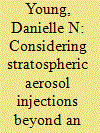| Srl | Item |
| 1 |
ID:
190918


|
|
|
|
|
| Summary/Abstract |
Stratospheric Aerosol Injection (SAI), is often referred to as a ‘Plan B’ if mitigation strategies to reduce emissions fail and the need to rapidly reduce global temperatures becomes urgent. In theory, SAI would help buy more time to bring carbon and other emissions down while also cooling or keeping the planet below the threshold for dangerous warming, though it is not a solution to the problem of climate change in itself. What little attention it has received in International Relations (IR) is usually focused on the need for governance of the technology and assumes that development and use of the technology will be driven primarily by vulnerability to climate impacts. Through an analysis of common security assumptions and preemptive security framings the article shows that while current assessments of SAI focus on the technology’s environmental impact, broader political and security dynamics, particularly the desire to render climate change more intelligible as a security problem with a solution may have substantial influence on how the technology is used and by whom.
|
|
|
|
|
|
|
|
|
|
|
|
|
|
|
|
| 2 |
ID:
180097


|
|
|
|
|
| Summary/Abstract |
Local authorities in the United Kingdom are recognised by central government as key agents to achieving the national net zero target aimed at stabilising global temperatures at or below 1.5 degrees in line with the Paris Climate Agreement. Since 2018, over 75% of local authorities have declared climate emergencies committing to achieving net zero greenhouse gas emissions. This paper presents the findings of a review of official public records published by 308 local authorities, City Regions and Combined Authorities declaring climate emergencies. Significant variability and ambiguity were found in their scope of commitment, delivery planning arrangements and funding plans. Few local authorities have embraced the concept of Citizens’ Climate Assemblies as a way of engaging civil society. A follow-up review showed that although there is near uniformity of political desire to tackle climate change, action planning is very much work in progress with tight delivery timelines for the majority, significant divergence in approaches, and an unclear role for the citizen. The research concludes that without a local-authority specific Net Zero duty and well-designed and financed delivery models, local authorities will choose their own routes and finishing lines shaped by a complex ecosystem of internal and external factors. A governance framework is proposed based on the concept of local area climate contracts to bring together national and local Net Zero ambitions.
|
|
|
|
|
|
|
|
|
|
|
|
|
|
|
|